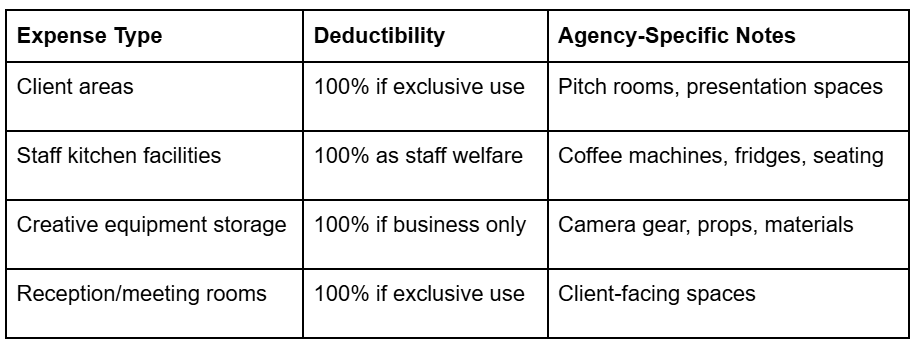Hybrid Working Tax Deductions for Agency Directors: Office vs Home Claims 2026

If you're like most agency directors, your working arrangement probably looks something like this: office space for client meetings and team collaboration, home office for focused work and late-night project reviews, and maybe some coffee shop sessions thrown in for good measure.
The challenge? HMRC's rules weren't designed with modern hybrid working in mind. You can't just claim everything and hope for the best - but you also can't afford to miss legitimate deductions in today's economic climate.
I regularly see agency directors missing significant tax relief opportunities. One common scenario involves directors paying substantial office rent while also working extensively from home. Without understanding the dual-use premises rules properly, they often miss thousands in legitimate deductions annually - money that could fund new hires or equipment upgrades.
Dual-Use Premises Rules
HMRC recognises that many business owners now operate across multiple locations, but there's a crucial principle at the heart of all business expense claims: the cost must be "wholly and exclusively" for business use. The confusion arises because this phrase means different things in different contexts.
For your commercial office space, this is straightforward. If you rent a space purely for business purposes, every legitimate business expense related to that space qualifies for relief. But when it comes to your home, HMRC draws a sharp distinction between exclusive and non-exclusive business use.
Think of it this way: your office boardroom used only for client meetings has exclusive business use. Your kitchen table where you answer emails between family dinners? That's non-exclusive use, and the rules are completely different.
Office Space Deductions: Building Your Foundation
For your commercial office space, the rules work in your favour. Every expense that's genuinely business-related can be claimed in full, and for agencies, this covers more ground than you might think.
The obvious expenses include rent, business rates, utilities, and insurance. But agencies have unique needs that generate additional deductible costs:

When claiming office expenses, organisation is everything. Keep lease agreements, utility bills, business rates certificates, and insurance policies in one place. I recommend scanning everything into a cloud storage system with clear folder structures, like Dext. It sounds basic, but when HMRC comes calling, having everything instantly accessible makes the difference between a smooth process and a stressful scramble.
Home Office Claims: Where Precision Matters
This is where most agency directors either over-claim or leave money on the table. The rules are more complex than office space deductions, but they're also extremely valuable when applied correctly.
The fundamental test is demonstrating genuine business use. For home office deductions, HMRC allows you to claim a proportion of your household costs based on both the space used and the time it's used for business purposes. Here's how this works in practice:
Proportional Claims Based on Use:
If you use a spare room as your office 3 days per week, you can claim a proportion of your household costs. The calculation considers both:
- Space: What percentage of your home does the room represent?
- Time: What percentage of time is it used for business?
Example Calculation:
- Spare room is 1 of 10 rooms in your home (excluding bathrooms and kitchens), or 10%.
- Used for business 3 out of 7 days per week (43% of the time)
- Potential claim: 10% × 43% = 4.3% of eligible household costs
Or, if you use the room exclusively for business (even if it's a spare room converted to an office):
- Spare room is 10% of your home's total area
- Used for business purposes only = 100% business use
- Potential claim: 10% of eligible household costs
The key is accurately recording and demonstrating your actual business use pattern, whether that's exclusive use of a dedicated space or proportional use of a shared room.
I see agency directors work with converted garages or dedicated rooms for business use. These spaces often qualify for the proportional costs method, which can deliver a significantly larger use of home claim than the simplified £6 per week allowance. The key is demonstrating exclusive business use and maintaining proper records.
The choice between simplified and proportional costs methods can dramatically impact your tax relief:

The proportional costs method requires more work but delivers better results when you have exclusive business use. You calculate your home office as a percentage of your total home area, then apply that percentage to household expenses like utilities. Additionally, any costs specifically for business use, such as a dedicated phone line or a desk, can be fully claimed.
Getting Utility Calculations Right
Utility bills represent one of the biggest opportunities for agency directors, particularly those running energy-intensive operations with multiple monitors, servers, or creative equipment.
For your office premises, the calculation is straightforward - claim 100% of utilities used for business purposes. But home office utility claims require more thought. Start with your business use percentage, then consider additional usage for equipment, if it’s quantifiable.
Take electricity as an example. If your home office represents 10% of your floor area, you may be able to claim 10% of your annual electricity bill. But if you're running professional equipment that significantly increases consumption and you can quantify it, you might choose to add that extra cost:
Electricity Calculation Example:
- Annual electricity bill: £1,200
- Business use percentage: 10% = £120
- Additional equipment usage: £150
- Total deductible: £270
Agency directors with home studios often run energy-intensive equipment - multiple monitors, professional lighting, servers, and creative tools. This additional consumption can significantly increase legitimate deduction amounts beyond the basic proportional calculation.
Gas and heating calculations work similarly, but with an additional consideration for extended heating during work hours. If you're heating your home office during times when you wouldn't normally heat the house for personal use, you might be able to factor in that additional consumption.
Internet costs deserve special attention for agencies. If you have a separate broadband line for business needs, such as handling video calls with multiple clients or uploading large creative files, the cost of the separate line is fully deductible. Business-grade internet upgrades often represent hundreds of pounds annually in legitimate deductions that many directors overlook.
Staying Compliant: Proper Documentation
HMRC audits often focus on home office claims because they're frequently misunderstood or over-claimed. Having the right documentation doesn't just support your claims - it deters HMRC from digging deeper.
Essential Documentation Checklist:
For Office Expenses:
- Lease agreements and property documents
- All utility bills and invoices
- Business rates certificates
- Insurance policies
- Bank statements showing payments
For Home Office Claims:
- Floor plan with business areas marked and measured
- Photographs showing exclusive business use
- Work-from-home diary (minimum one month)
- Utility bills for complete year
- Equipment receipts for business-only items
It seems basic, but I've seen agency directors struggle during audits simply because they couldn't locate a gas bill from two years ago. The key is presenting the story in an organised way that HMRC can easily follow. When they see a floor plan showing a dedicated 150-square-foot office in a 1,500-square-foot home, photographs confirming exclusive business use, and utility bills supporting the 10% calculation, they understand it fairly easily. Confusion leads to questions.
Building Systems That Scale
The most important advice I give agency directors is to build systems now that will serve you as your business grows.
Create monthly reviews of your office and home office usage. If your working pattern changes significantly, adjust your claims accordingly. HMRC appreciates consistency and logical explanations more than perfect calculations that don't reflect reality.
Consider the administrative burden too. Detailed proportional cost calculations might save £1,500 annually, but if they require ten hours of monthly administration, you might be better served focusing that time on billable client work and using the simplified method.
Hybrid Working Opportunity
Hybrid working tax relief represents a significant opportunity for agency directors, but only when approached systematically. The rules are complex enough that mistakes are costly, but clear enough that proper planning delivers predictable results.
Need help implementing these strategies in your agency?
Our team specialises in helping agencies optimise their tax position while staying fully compliant. Book a 30-minute strategy call to review your specific situation and create a plan that works for your business.




